
- An independent panel has said Chinese officials could have applied public health measures more forcefully during the initial period of the pandemic
- The panel also criticised the World Health Organization (WHO) for delays in declaring an international emergency
China and the WHO could have acted faster to avert catastrophe during the early stages of the coronavirus outbreak, a panel of independent experts has concluded. The Independent Panel for Pandemic Preparedness and Response in its second report on the pandemic said its evaluation of the start of the crisis in China “suggests that there was potential for early signs to have been acted on more rapidly”.
The experts reviewing the global handling of the pandemic, led by former New Zealand prime minister Helen Clark and former Liberian president Ellen Johnson Sirleaf, called for reforms to the Geneva-based UN agency. The report was released on the panel’s website.
The panel findings come at a time when a team of scientists are in Wuhan to investigte into the origins of the Covid-19 virus. The US has called on China to allow WHO investigators to interview care workers, patients and lab workers in Wuhan which has been denied by China thus far.
The Independent Panel in their second report has found that containment measures should have been implemented immediately in all countries where transmission was likely. The panel’s report is due to be presented to the WHO’s executive board on Tuesday. The panel said it was clear that “public health measures could have been applied more forcefully by local and national health authorities in China in January”.
The report also criticised the WHO for dragging its feet at the start of the crisis, pointing out that the UN health agency did not convene its emergency committee until January 22, 2020. The WHO appointed committee failed to agree to declare the outbreak a Public Health Emergency of International Concern (PHEIC) — its highest alert level — until a week later, observes the panel.

“It is not clear why the committee did not meet until the third week of January, nor is it clear why it was unable to agree on the (PHEIC) declaration… when it was first convened,” the report said. As evidence emerged of human-to-human transmission, “in far too many countries, this signal was ignored”, it added.
The WHO has already been called out for being too slow to declare an international crisis, to acknowledge the virus was spreading through the air, and to recommend face masks. The panel called for a “global reset” and said it would make recommendations in a final report to health ministers from the WHO’s 194 member states in May.
WHO’s spoesperson told reporters last week there would be “no guarantees of answers” regarding the pandemic’s origins. “It is a difficult task to fully establish the origins and sometimes it can take two or three or four attempts to be able to do that in different settings”, he said.
Under Trump, the US has accused the WHO of being “China-centric”, which the agency denies. European countries led by France and Germany have pushed to address the WHO’s shortcomings on funding, governance and legal powers.
The director general of the WHO, Tedros Adhanom Ghebreyesus, announced in July that the UN body was setting up the Panel for Pandemic Preparedness and Response to review its conduct and that of governments.
